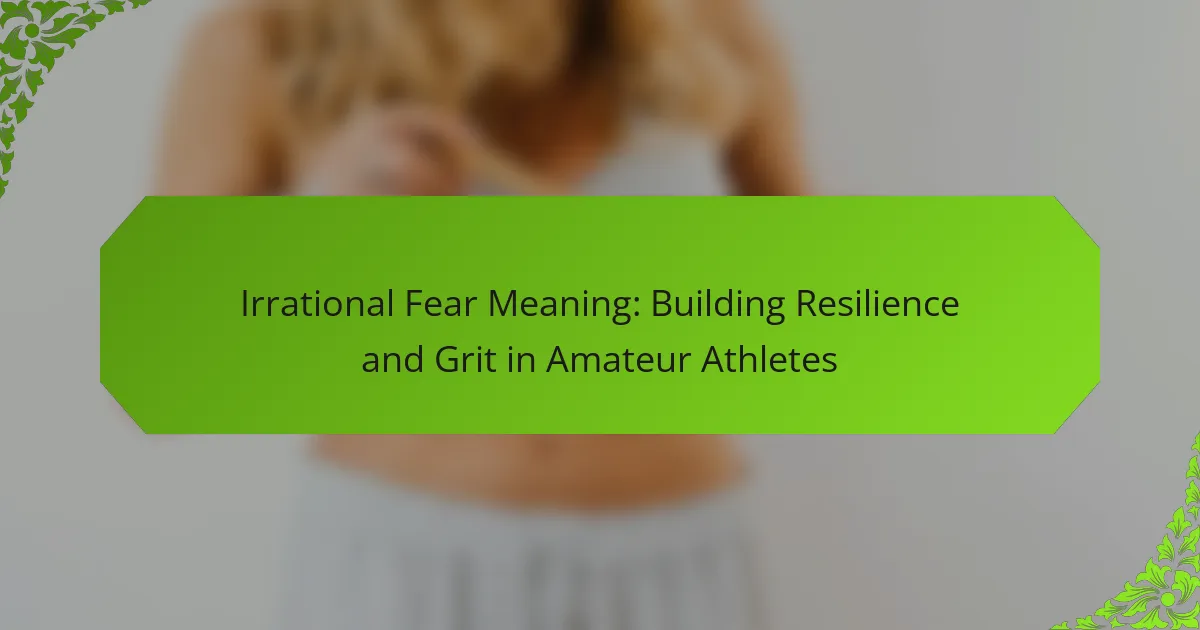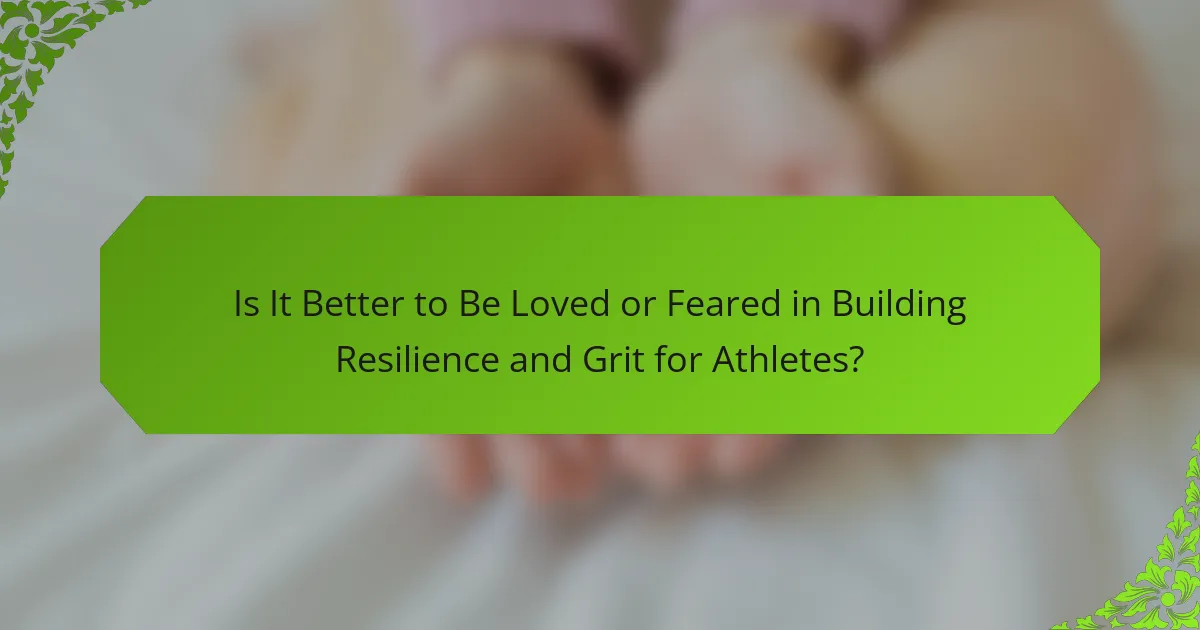Building resilience and grit is essential for amateur athletes striving for mental toughness. This article explores the significance of resilience in overcoming challenges, highlights key practices for developing mental strength, and discusses the role of adaptability and emotional regulation. It also outlines actionable steps to enhance resilience, including goal-setting and mindfulness techniques, while emphasizing the importance of a supportive community.
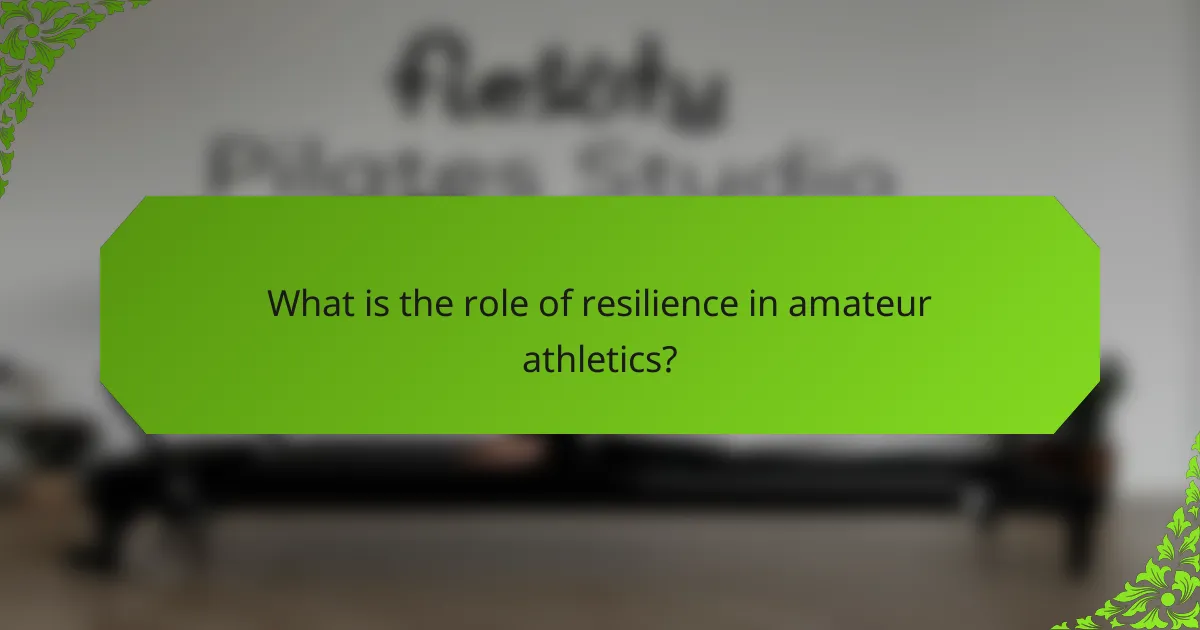
What is the role of resilience in amateur athletics?
Resilience plays a crucial role in amateur athletics by enhancing mental toughness and perseverance. It enables athletes to overcome challenges, adapt to setbacks, and maintain focus during competition. Resilient athletes often exhibit unique attributes such as grit, which drives them to push through adversity. Studies indicate that resilience correlates with improved performance and satisfaction in sports. Developing resilience can involve techniques like visualization, goal-setting, and positive self-talk, which foster a strong mindset. As a result, amateur athletes who cultivate resilience are better equipped to handle pressure and achieve their objectives.
How does grit contribute to mental toughness?
Grit enhances mental toughness by fostering persistence and resilience in amateur athletes. This quality enables athletes to overcome challenges and setbacks effectively. Research shows that grit correlates with long-term success, as it encourages sustained effort towards goals. By cultivating grit, athletes develop a mindset that embraces adversity, ultimately leading to improved performance and mental fortitude.
What are the key characteristics of resilient athletes?
Resilient athletes exhibit mental toughness, adaptability, and a strong sense of purpose. They maintain focus under pressure and embrace challenges as growth opportunities. Key characteristics include perseverance, emotional regulation, and a positive mindset. These attributes enable them to recover from setbacks and sustain performance over time. Resilience is often built through consistent training and a supportive environment, fostering grit and determination essential for success.
What mindset shifts foster resilience?
Mindset shifts that foster resilience include adopting a growth mindset, embracing challenges, and viewing failures as learning opportunities. Amateur athletes can enhance their mental toughness by focusing on effort over outcome and developing self-compassion. These shifts lead to increased grit and persistence, essential traits for overcoming obstacles in sports. Cultivating a supportive environment and practicing mindfulness also contribute to building resilience, enabling athletes to navigate pressures effectively.
How can athletes cultivate grit in their training?
Athletes can cultivate grit by setting clear goals, embracing challenges, and maintaining a positive mindset. Focus on incremental progress and develop a routine that includes mental resilience training.
1. Set specific, measurable goals to track progress.
2. Embrace challenges as opportunities for growth.
3. Develop a supportive training environment.
4. Practice visualization techniques to enhance mental toughness.
5. Reflect on failures to learn and adapt strategies.
6. Maintain consistency in training despite obstacles.
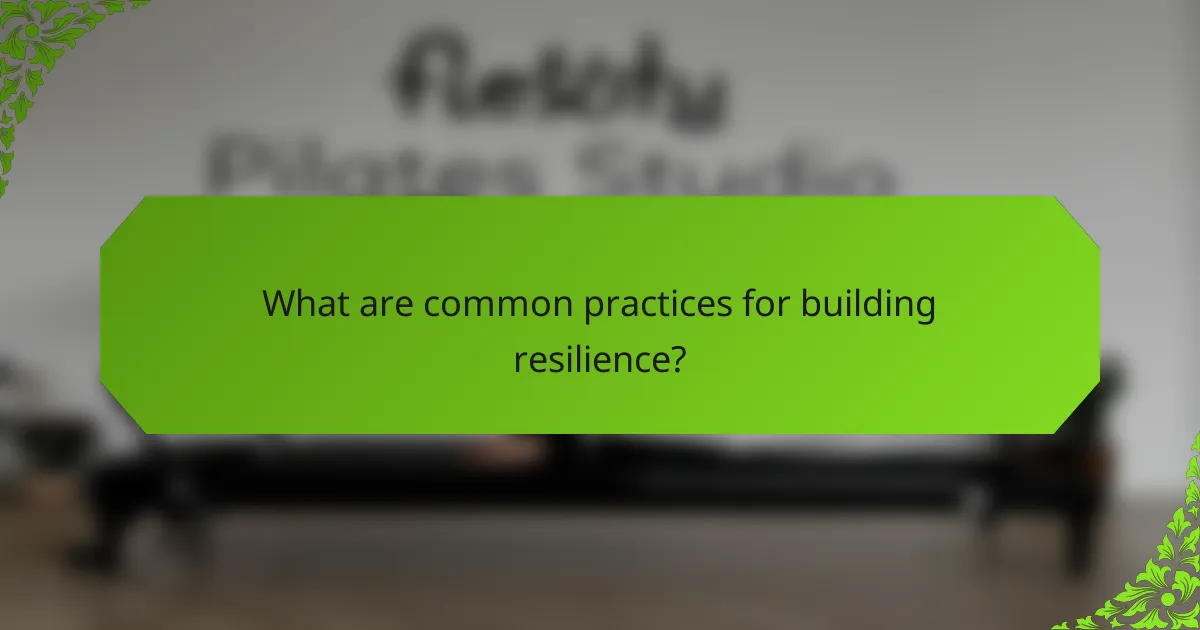
What are common practices for building resilience?
Building resilience involves consistent practices that enhance mental toughness. Key practices include setting realistic goals, maintaining a positive mindset, and developing coping strategies.
Regular physical training builds both physical and mental strength. Engaging in mindfulness and stress management techniques fosters emotional regulation. Seeking social support from teammates or mentors provides encouragement and perspective.
Tracking progress and celebrating small victories reinforces resilience. Finally, embracing challenges as opportunities for growth cultivates grit, essential for amateur athletes’ mental toughness.
How does goal setting enhance mental toughness?
Goal setting enhances mental toughness by providing clear objectives that foster resilience and grit in amateur athletes. It creates a roadmap for progress, helping athletes focus their efforts and maintain motivation. Specific, measurable goals encourage accountability and perseverance, essential traits for overcoming challenges. Furthermore, achieving these goals builds confidence, reinforcing a positive mindset that contributes to long-term mental toughness.
What role does visualization play in developing grit?
Visualization plays a crucial role in developing grit by enhancing mental resilience in amateur athletes. It allows athletes to mentally rehearse challenges, fostering a sense of preparedness and confidence. Research indicates that athletes who regularly engage in visualization techniques show improved focus and reduced anxiety, which are essential components of grit. Visualization also helps in setting specific goals and maintaining motivation, reinforcing a growth mindset. This process aligns with the unique attribute of grit, emphasizing sustained effort and passion over time.
What techniques improve focus and concentration?
To improve focus and concentration, amateur athletes can employ techniques such as mindfulness, goal-setting, and visualization. Mindfulness enhances awareness of the present moment, reducing distractions. Goal-setting provides clear direction and motivation, while visualization helps mentally prepare for performance, reinforcing mental toughness. Regular practice of these techniques builds resilience and grit, essential for athletic success.
How can athletes learn from failure?
Athletes can learn from failure by developing resilience and grit, which are essential for mental toughness. Embracing setbacks as opportunities for growth fosters a positive mindset. Analyzing mistakes helps identify weaknesses, enabling focused improvement. Furthermore, sharing experiences with peers enhances learning and builds a supportive community. Ultimately, consistent reflection on failures cultivates a stronger, more determined athlete.
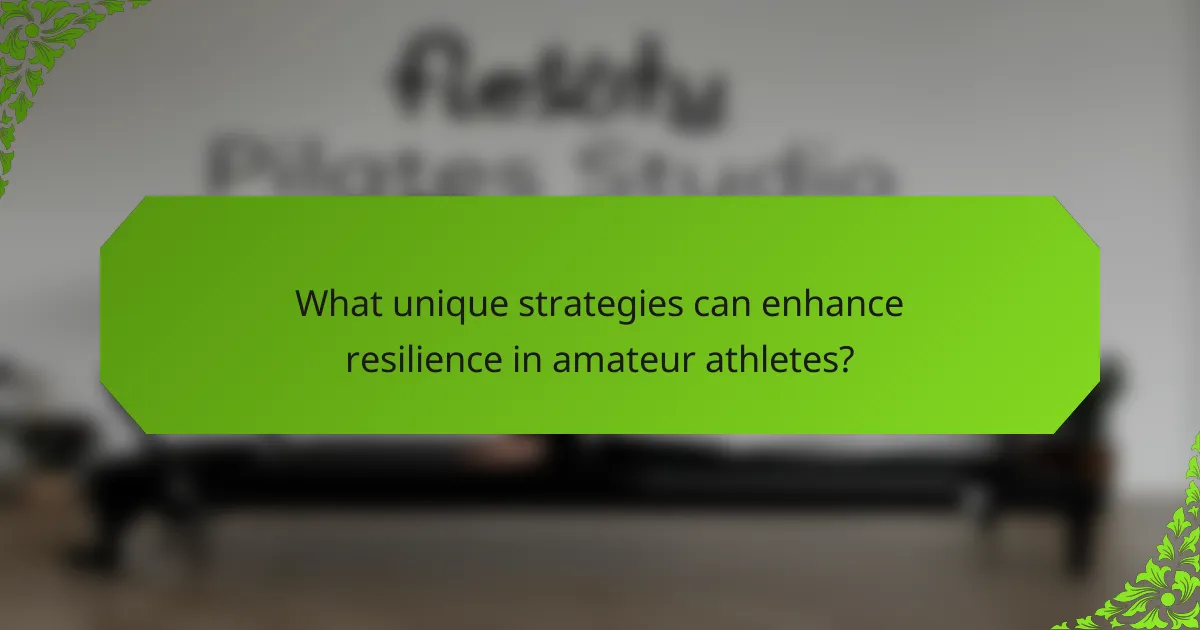
What unique strategies can enhance resilience in amateur athletes?
Developing resilience in amateur athletes requires unique strategies that focus on mental toughness. These strategies include fostering a growth mindset, enhancing emotional regulation, and implementing consistent goal-setting practices.
A growth mindset encourages athletes to view challenges as opportunities for improvement, which can significantly boost their resilience. Emotional regulation techniques, such as mindfulness and visualization, help athletes manage stress and maintain focus during competitions.
Consistent goal-setting provides a clear roadmap for progress, allowing athletes to celebrate small victories and build confidence. These strategies collectively enhance the mental toughness necessary for success in sports.
How can team dynamics support individual grit?
Team dynamics significantly enhance individual grit by fostering a supportive environment. When athletes collaborate, they build resilience through shared experiences and encouragement. This collective strength helps individuals push through challenges. For example, teams can engage in joint goal-setting, which reinforces commitment and accountability. As a result, athletes develop mental toughness, essential for overcoming obstacles. The unique attribute of teamwork lies in its ability to create a sense of belonging, motivating individuals to persist and excel.
What are the benefits of mentorship in building resilience?
Mentorship significantly enhances resilience by providing guidance, emotional support, and practical strategies. It fosters grit through shared experiences and accountability, helping amateur athletes navigate challenges more effectively. Mentors instill confidence, which is a unique attribute that strengthens mental toughness. Research shows that athletes with mentors exhibit improved coping mechanisms and persistence in the face of setbacks. This support network ultimately cultivates a growth mindset, essential for long-term success in sports.
What specific exercises strengthen mental toughness?
Endurance training, mindfulness practices, and goal-setting exercises specifically strengthen mental toughness in amateur athletes. Endurance training enhances resilience through physical challenges. Mindfulness practices improve focus and emotional regulation. Goal-setting exercises foster grit by promoting perseverance through setbacks. These exercises collectively build a robust mental framework essential for athletic success.
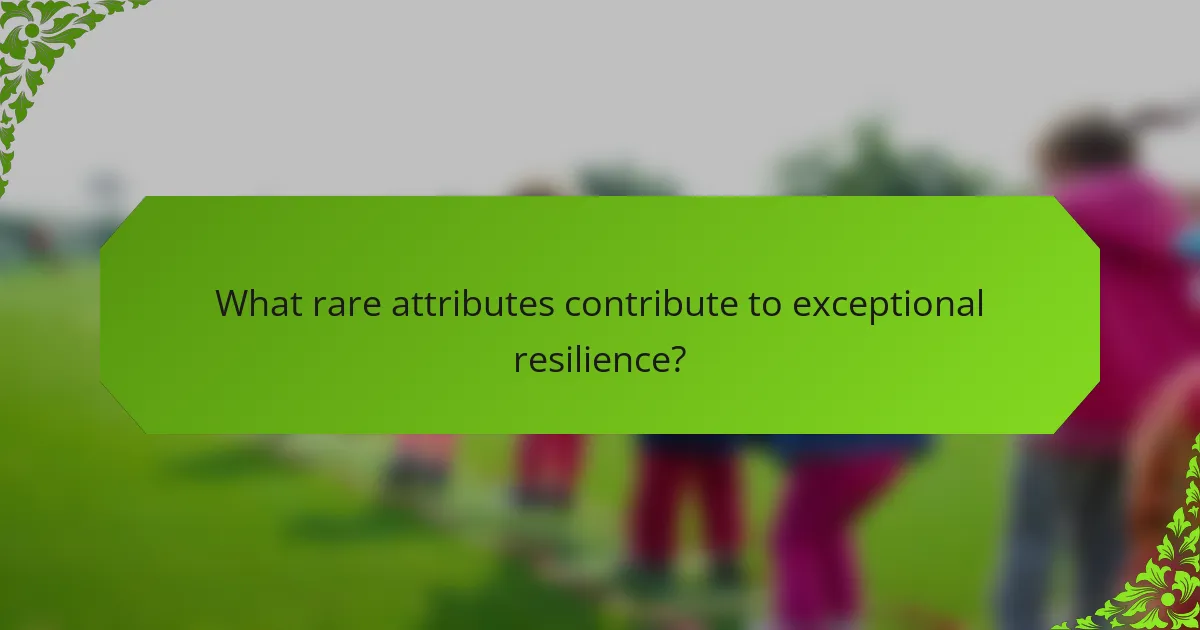
What rare attributes contribute to exceptional resilience?
Exceptional resilience in amateur athletes stems from rare attributes such as adaptability, emotional regulation, and intrinsic motivation. Adaptability enables athletes to adjust their strategies in response to challenges, fostering grit. Emotional regulation allows for better management of stress and anxiety, enhancing mental toughness. Intrinsic motivation drives sustained effort and commitment, even in the face of setbacks. These attributes collectively contribute to a robust mindset essential for overcoming obstacles in sports.
How does emotional intelligence impact athletic performance?
Emotional intelligence significantly enhances athletic performance by fostering resilience and grit. Athletes with high emotional intelligence manage stress effectively, maintain focus under pressure, and exhibit strong interpersonal skills, which are crucial for teamwork. Research indicates that emotionally intelligent athletes often demonstrate superior mental toughness, leading to improved outcomes in competitive settings. This ability to navigate emotions can transform challenges into opportunities for growth, ultimately benefiting amateur athletes in their pursuit of excellence.
What uncommon practices can lead to greater grit?
Uncommon practices that can enhance grit include embracing discomfort, practicing mindfulness, and setting unconventional goals. Embracing discomfort helps athletes build resilience by pushing their limits. Mindfulness cultivates mental clarity and focus, essential for overcoming challenges. Setting unconventional goals encourages creativity and adaptability, fostering a growth mindset.
How can athletes leverage adversity for growth?
Athletes can leverage adversity for growth by developing resilience and grit. Facing challenges enhances mental toughness, enabling athletes to adapt and improve.
Adversity fosters problem-solving skills, as athletes learn to navigate setbacks. This experience builds confidence, reinforcing a positive mindset. Research indicates that overcoming obstacles can lead to higher performance levels.
Additionally, learning from failures cultivates a growth mindset. Athletes who embrace challenges view them as opportunities rather than threats. This perspective shift is essential for long-term success.
In summary, adversity serves as a catalyst for personal and athletic development, transforming setbacks into stepping stones for achievement.
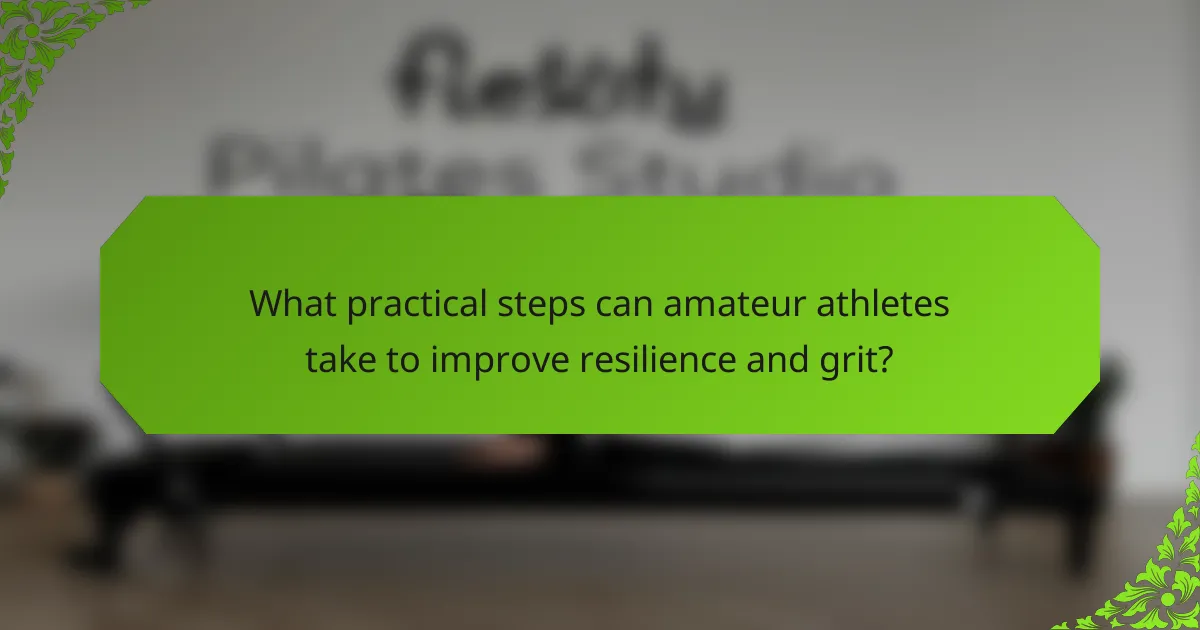
What practical steps can amateur athletes take to improve resilience and grit?
Amateur athletes can enhance resilience and grit through specific, actionable steps. Regularly setting and pursuing challenging goals fosters mental toughness. Engaging in deliberate practice helps develop skills under pressure. Embracing failure as a learning opportunity builds a growth mindset. Incorporating mindfulness techniques reduces stress and enhances focus. Lastly, building a supportive community provides encouragement and accountability.
What are the best practices for daily training routines?
To build resilience and grit, amateur athletes should adopt structured daily training routines. Focus on consistency, mental conditioning, and recovery techniques.
Incorporate varied workouts that challenge both physical and mental limits. This includes strength training, endurance exercises, and skill drills.
Set specific, measurable goals to track progress and maintain motivation. Regularly assess mental toughness through self-reflection and journaling.
Prioritize rest and recovery to prevent burnout. Techniques such as mindfulness and visualization can enhance mental resilience.
How can athletes avoid common pitfalls in their mental training?
Athletes can avoid common pitfalls in mental training by focusing on self-awareness, setting realistic goals, and practicing mindfulness. Developing resilience requires understanding personal triggers and stressors. Emphasizing grit involves consistent effort and learning from setbacks. Regular reflection on performance enhances mental toughness.
What expert insights can enhance resilience and grit?
Expert insights to enhance resilience and grit include focusing on mental strategies, emotional regulation, and goal-setting techniques. Practicing visualization can strengthen an athlete’s mental toughness, helping them to anticipate challenges. Emotional regulation techniques, such as mindfulness, promote resilience by improving focus and reducing anxiety. Setting specific, measurable goals fosters a growth mindset, encouraging athletes to embrace setbacks as learning opportunities. Engaging in regular reflection on experiences builds self-awareness, crucial for developing grit over time.
What resources are available for ongoing development?
Amateur athletes can access various resources for ongoing development, including training programs, workshops, and mental toughness courses. These resources help build resilience and grit essential for performance enhancement.
1. Online training platforms offering courses on mental toughness.
2. Local sports clubs providing workshops focused on resilience.
3. Books and articles on psychological strategies for athletes.
4. Podcasts featuring expert discussions on mental strength.
5. Online forums for peer support and sharing experiences.
6. Mobile apps designed for tracking progress and motivation.
